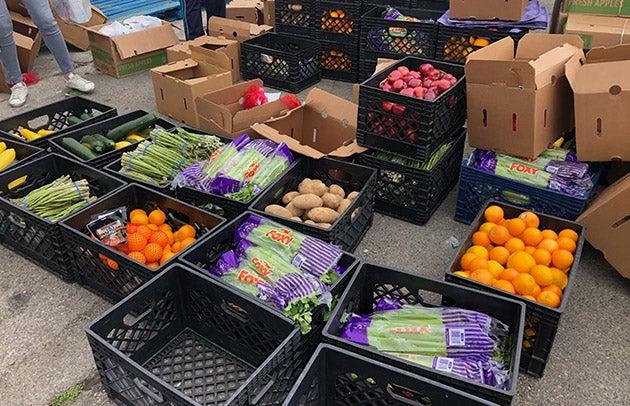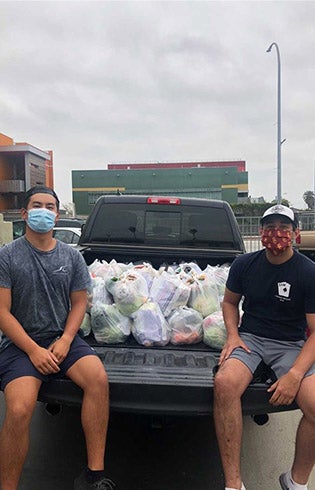
Homebound Angelenos, challenged to obtain food, get help from USC students
In brief:
- After learning about Los Angeles’ food insecurity problem, USC students started a nonprofit that delivers groceries to the homebound.
- Good2Go has made 3,000 deliveries to those in need since the organization began in February.
- Its “micro-volunteering” model allows students to volunteer between work and classes.
Nearly 1 million people in Los Angeles County are facing food insecurity, meaning they aren’t sure where their next meal will come from. Food pantries can fill this gap but getting donations into the hands of those in need isn’t always easy — especially in a sprawling metropolis like L.A.
For the elderly, disabled or those without a car, navigating public transportation while carrying bulky bags poses a challenge. Others work during food pantry hours or live too far from one to make it by public transportation.
Good2Go, a community organization founded by USC students in the spring of 2021, is bringing food to those who can’t make the journey. Each week, a fleet of volunteers picks up groceries from the Salvation Army and Family Health Care Resources food banks and delivers them to homebound Angelenos. For many recipients, it will be their only food until the next delivery.
“I used to associate food insecurity with a lack of available food. However, we found that the root of the problem actually lies in accessibility,” says Tatiana Vaz ’21, who graduated from the USC Dornsife College of Letters, Arts and Sciences with a degree in economics.
Coursework to volunteer work

Fresh produce awaits sorting, packaging and delivery by Good2Go volunteers.
Good2Go began in the USC Viterbi School of Engineering course “Innovation in Engineering and Design for Global Crises” (CE 486b). There, Vaz met five other USC students in a group project tasked with researching solutions to pressing social issues.
Vaz was startled to learn that although the planet produces enough food to feed the population twice over, many L.A. residents don’t get enough to eat. Some 1 in 3 of the food insecure don’t have a reliable means of transportation to obtain food.
“This absolutely baffled me and encouraged me to dive deeper. As we learned more, I became passionate about addressing this gap in our society,” she says.
After the class ended, the group launched Good2Go in February of 2021. They reached out to several nonprofit organizations — the Salvation Army, Family Health Care Resources, and Community in Schools Los Angeles — to arrange to pick up and deliver groceries for clients that couldn’t make it in person.
They were immediately rewarded for their work.
“I went to a specific apartment complex location every Friday. There were always the same four or five people waiting for their delivery,” says Michel Faliski, a Good2Go founder who graduated in 2021 from the USC Iovine and Young Academy. “The smiles on their faces and the gratitude that they have for us helping reminds us every week how important what we’re doing is to people.”
Small acts of kindness

Students Tyler Sato, left, and Eddie Chagoya, who can sign up for shifts that work around their school schedules, rest between grocery deliveries.
Since their launch, Good2Go has made over 3,000 deliveries to those in need. The group’s success comes largely from its emphasis on a “micro-volunteering” model.
Volunteers fill out an application with their availability and Good2Go presents a list of drop-off times that fit their schedule. Students can fit in a delivery on their way home from work or between classes without having to commit to an all-day or long-term shift.
“In an ever-accelerating world, we believe it’s important to design convenient volunteer opportunities that individuals can integrate into their every day,” says Julia Desantis ’22, a Good2Go founder and senior at the USC Annenberg School for Communication and Journalism.
The group hopes to turn the Good2Go model into a broader platform for micro-volunteering, where people can sign up for various volunteer opportunities during short time slots.
Driving for change
A USC class might have sparked the start of the organization, but some volunteers find food advocacy to be a personal issue.
“My grandma, a New York City native, was born and raised in the projects. My grandpa, a refugee from China, grew up in survival mode,” says Ashton Tu, a Good2Go founder who graduated in 2020 from the USC School of Cinematic Arts. “A nearby church food pantry served as a lifeline for them during difficult times. Food accessibility changed my grandparents’ lives and gave them hope and a future.”
With a majority of the Good2Go original founders recently graduated, and with the holiday season escalating demand for drivers, Good2Go is actively looking for more volunteers and recruiting for their core team.
Interested USC students and others in the community can sign up for shifts on the Good2Go website and get up-to-date information about volunteer opportunities on the Good2Go Instagram. “Food accessibility changes the trajectory of so many individuals’ futures. When you volunteer with Good2Go, you are providing families with essential, nutritious food items that they need. It might be the only food they get for the week. We invite you to partner with us and change the landscape of the LA food economy,” Tu says.